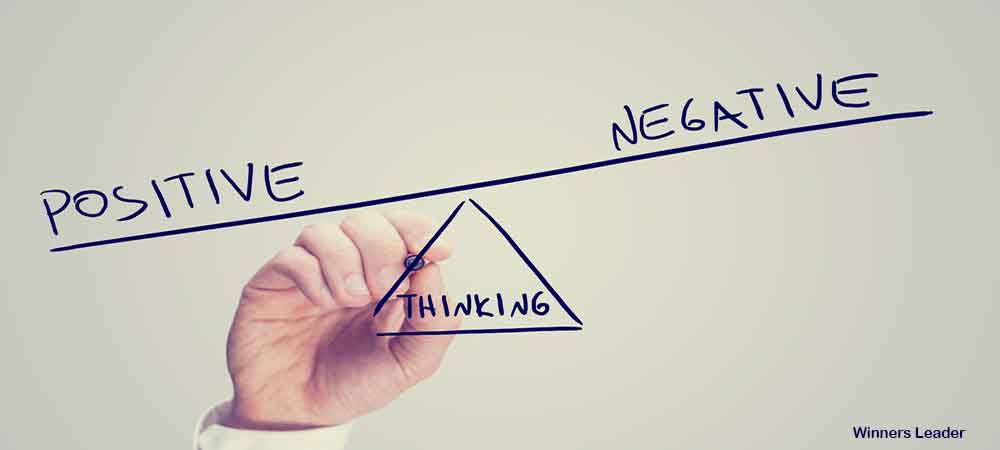Negative thinking is a manner of thinking where individuals will in general locate the most noticeably terrible in all things, or decrease their desires by thinking about the most exceedingly awful potential situations. This methodology can alleviate disillusionment in certain circumstances; at the same time, negative deduction will in general show into an example that can cause colossal pressure, stress, or trouble after some time. The contrary methodology would be certain reasoning, moving toward circumstances or conditions with an inspirational demeanor.
Negative thoughts are insights about oneself, others, or the world when all is said in done that are portrayed by negative recognitions, desires, and attributions and are related with undesirable feelings and unfavorable conduct, physiological, and wellbeing results.
Negative thoughts are psychological segments of negative psychosocial factors, for example, burdensome side effects, nervousness, depression, and aggression. Burdensome discernments, for example, incorporate considerations of sadness, defenselessness, and reduced self-esteem. Tension is a negative full of feeling state or attribute that is joined and propagated by stress and rumination. Forlornness is a negative state or characteristic that is described by impression of social danger, negative desires in social cooperations.
Negative thinking is a perspective that doesn’t profit you by any means. Once in a while, it even has a prompt negative effect on your life, since it can add to things like pressure, tension, and sadness.
Common Examples of Negative Thinking
• My work pays truly well and quick tracks its representatives into higher situations since they’re developing so rapidly, however sitting in a dim, exhausting desk area tuning in to tragic FM radio throughout the evening from the desk area nearby is simply excessively.
• Urban situations are incredible for cafés and culture, however for what reason would I live there in the event that I am simply going to continually stressed I will be ambushed or my home will be looted?
• Some individuals think about this snow is lovely. I think it just destroys everything. You can’t get the opportunity to work, you need to scoop, and you can fall and hurt yourself. Forget about it.
Negative Reasoning Is Pointless, Not ‘off-base’
The most well-known purposes behind disposing of negative reasoning are that it regularly causes you to feel awful, makes you less sure, and makes you less effective throughout everyday life. The general characterizing normal for negative reasoning is that it is futile and doesn’t improve your life in any capacity (or even promptly aggravates it).
Nonetheless, this doesn’t imply that negative reasoning is the ‘incorrect’ approach to think. Just that it’s futile for improving your life, and that it doesn’t bode well to do, particularly when you consider that you can think in different manners.
Is The Glass Half Full or Half Unfilled?
To get this, think about the great case of taking a gander at a glass, and considering it either half full or half unfilled. It’s neither right nor wrong to take a gander at the glass as either half full or half unfilled.
Be that as it may, if taking a gander at the glass as half full normally causes you to feel more joyful, while taking a gander at the glass as half void normally causes you to feel discouraged, at that point what is the sense in taking a gander at the glass as half vacant?
Negative Thinking Isn’t Truly Reasonable
For this model, on the off chance that you need to be glad, it looks bad to take a gander at the glass as half void as opposed to half full. All things considered, this is a futile, foolish, and totally counter-gainful activity. Regardless of whether it’s a totally substantial and adequate perspective, so what? It’s as yet not reasonable.
This model catches the pith of what dispensing with negative reasoning is tied in with: disposing of reasoning that is pointless, non-useful, and counter-gainful (and, in this manner, not truly reasonable, regardless of how ‘substantial’ the idea may be).
Negative Thinking Patterns and Your Beliefs
As indicated by hypotheses of psychological treatment, your musings and qualities decide the manner in which you see yourself and your general surroundings. Musings and convictions that are grounded in cynicism can adversely affect your sentiments, feelings, and emotional well-being. These unsafe recognitions are normal issues that can add to the side effects of mind-set and uneasiness issues.
Self-Defeating Beliefs and Negative Thinking Patterns
So as to conquer negative reasoning examples and pointless convictions, it is critical to comprehend the definitions and contrasts between these two ideas.
Self-Defeating Beliefs
Your conviction framework is comprised of your own perspectives, mentalities, and qualities. Your convictions are consistent with you, forming the manner by which you see yourself and your general surroundings. Foolish convictions can set you up for disappointment and disappointment. For example, on the off chance that it is your conviction that your self-esteem is exclusively controlled by your achievements, you will possibly feel satisfied when you are exceeding expectations at your vocation, accomplishing your objectives, or arriving at an ideal degree of status.
Self-defeating beliefs fall into two categories: intrapersonal convictions you have about yourself and relational convictions about your connections.
Intrapersonal
• Perfectionism
• Approval
• Achievement
Interpersonal
• Blame
• Submissiveness
• Fear of contention
Negative reasoning examples: Unlike foolish convictions, negative reasoning examples are not generally with you. Or maybe, they possibly surface when you are confronted with an issue. Otherwise called psychological twists, these negative musings will strike a chord during seasons of pressure and strengthen your reckless convictions. For example, maybe you hold the reckless conviction that your value is exclusively characterized by your accomplishments. You may feel alright as long as you can reliably arrive at your objectives. In any case, when confronted with unexpected misfortunes or snags, negative reasoning examples may make you over-dissect or misrepresent the seriousness of a circumstance, at last setting off unwarranted nervousness.
In such conditions, you may start to have negative considerations, for example, marking yourself a “disappointment” or censuring yourself for not arriving at your objective. You may ponder internally, “I will never be a triumph” or “it must not have been intended to be.” Over time, these musings can bring down one’s confidence and may even add to the indications of sorrow.
The Most Common Negative Thinking Traps
• Filtering: You stay totally upon a residue bit you notice on a Van Gogh painting.
• Polarized thinking: If you’re not great, you’re a disappointment. Individuals are either brilliant or horrendous.
• Overgeneralization: You tumbled off the pony on your first attempt, along these lines you will fall each time you jump on a seat.
• Jumping to Conclusions: Your companion hasn’t required some time, along these lines she loathes you.
• Catastrophizing: Disaster is unavoidable: No doubt about it “Consider the possibility that. What if? What if?”
• Personalization: Everything that happens is about you. Your closest companion began playing tennis since he realizes you don’t care for the game.
• Control Fallacies: You feel like a powerless survivor of outside powers. Or on the other hand, you feel actually liable for everybody’s joy.
• Fallacy of Fairness: You are the one in particular who realizes what is reasonable, and you’re certain that you are being dealt with unreasonably.
• Blaming: You reprimand others for your agony. Or then again, you censure yourself for everything.
• Shoulds: There are decides that must be obeyed by everybody. On the off chance that you abuse the guidelines, you feel regretful. On the off chance that others defy the norms, you feel irate.
• Emotional Reasoning: My feelings characterize reality. I feel terrible, in this manner I am revolting.
• Fallacy of Change: You want to change individuals to fulfill yourself.
• Global Labeling: An outrageous type of summing up with misrepresented and genuinely stacked names for yourself as well as other people. You bomb a test and consider yourself a “lifetime washout.”
• Always Being Right: Being incorrectly isn’t a choice. You will take the necessary steps to win a contention.
• Heaven’s Reward Fallacy: If you try sincerely and penance, you will consistently be compensated. On the off chance that that prize doesn’t come when you need it, you become furious and unpleasant.
In our next segment, we’ll give a few strategies to complementing the positive and disposing of the negative.
Impacts Of Negative Thinking
The essential motivation to relinquish negative musings is that they keep you from getting a charge out of the considerable number of advantages of positive reasoning.
When this is obvious to your cerebrum, it is more spurred and empowered to assist you with finding a way to quit thinking contrarily. What’s more, this is the manner by which you begin wiping out negative deduction on autopilot.
In light of this, here are 11 impacts of negative reasoning, which are likewise 11 different ways that negative reasoning keeps you from getting a charge out of the advantages of positive reasoning.
1. A less advantageous life rather than a more beneficial life
2. Less certainty rather than more noteworthy certainty
3. Lower confidence rather than higher confidence
4. Less satisfaction and delight rather than more bliss and pleasure
5. Less sentiments of solidarity rather than more noteworthy sentiments of solidarity
6. Less vitality rather than more vitality
7. Less genuine feelings of serenity rather than more significant serenity
8. Less accomplishment rather than more achievement
9. Less charming social associations rather than more pleasant social collaborations
10. Less medical advantages rather than more medical advantages
11. Less lucidity of psyche rather than more prominent clearness of brain: since you have a decision, it doesn’t bode well to think in negative manners that hurt you instead of positive ways that help you
A Final Drawback Of Negative Thinking: A Less Reasonable Brain
This last negative impact of negative reasoning — less lucidity of psyche — merits thinking about further, as it’s useful for your brain to value that negative reasoning is only a less sensible perspective, when you look at what as a negative effect it has on you.
Consider it: on the off chance that you can think positive contemplations that consistently help you, as opposed to negative considerations that consistently harmed you, how on earth
does it bode well to think negative musings that aggravate your life or to ever endure the impacts of negative self talk?
It doesn’t.
In this light, negative reasoning is consistently a “glitchy” perspective as in there will never be an incredible, brilliant motivation to do it.
Figure Out How to Stop Thinking Negatively
One of the essential pieces of a treatment plan including psychological conduct treatment (CBT) is intellectual rebuilding. This procedure encourages you to recognize and change negative musings into more supportive and versatile reactions.
Regardless of whether done in treatment or all alone, psychological rebuilding includes a bit by bit process whereby negative contemplations are recognized, assessed for precision, and afterward supplanted. Despite the fact that it is hard to think with this new style from the start, after some time and with training, positive and sound contemplations will come all the more normally.
Work on Coping With Criticism
Notwithstanding intellectual rebuilding, another part of CBT that is at times accommodating includes something known as the “decisive barrier of oneself.” Since it is conceivable that a portion of the time, individuals will really be basic and critical toward you, it is significant that you can adapt to dismissal and analysis.
This procedure is generally directed in treatment with an imagine discussion among you and your specialist to develop your emphaticness abilities and self-assured reactions to analysis. These aptitudes are then moved to this present reality through schoolwork tasks.
Practice Mindfulness
Care has its underlying foundations in contemplation. It is simply the act of segregating from your musings and feelings and review them as an outside onlooker.
During care preparing, you will figure out how to see your musings and emotions as items gliding past you that you can stop and watch or let cruise you by. The target of care is to oversee your enthusiastic responses to circumstances by permitting the thinking part about your cerebrum to dominate.
Keep away from Thought Stopping
Thought halting is something contrary to care. It is the demonstration of being watching out for negative contemplations and demanding that they be disposed of.
The issue with thought halting is that the more you attempt to stop your negative considerations, the more they will surface. Care is ideal since it gives less weight to your contemplations and lessens the effect they have on you. Figured halting may appear to help for the time being, however after some time, it prompts more nervousness.
Utilize a Thought Diary
Thought journals, likewise called idea records, can be utilized as a major aspect of any procedure to change negative reasoning. Thought journals assist you with distinguishing negative reasoning styles and increase a superior comprehension of how your musings (and not the circumstances you are in) cause your enthusiastic responses. Most CBT treatment plans will include the utilization of an idea journal as a component of standard schoolwork tasks.
For instance, an idea journal section may separate the point of view of an individual out on the town, and the enthusiastic and physical responses that outcome from negative reasoning examples. Before the finish of the idea examination, you can supplant silly contemplations about dismissal with more supportive and positive perspectives.
Question The Idea
One thing I like to do when a negative idea taps me on the shoulder and attempts to begin developing in my brain is to just to scrutinize that idea.
Supplant The Pessimism In Your Environmental Factors
What you let into your psyche in your regular daily existence will have huge impact on you. So begin addressing what you permit in.
Live In and Return to This Second
At the point when you’re taking advantage of negative reasoning at that point you’re frequently contemplating something that occurred. Or then again something that may occur. Or on the other hand both, all confused up as your state of mind and contemplations sink.
Concentrate Just On Your Relaxing
Take a 1 brief delay at the present time and take a little more profound breaths than you generally do. Guarantee you’re breathing with your stomach and through your nose. During this time base just on the air going in and out and that is it.
The Most Effective Method to Harness the Positive Power of Negative Thinking
Pop brain research reveals to us we can’t turn out badly with positive reasoning. Be that as it may, new examinations show that assessing our snags is fundamental to progress.
A developing collection of exploration recommends that negative reasoning, if deliberately sought after, has a task to carry out in bliss, as well. Antiquated philosophical and profound conventions, from the Stoics to the Buddhists, perceived the life-upgrading capability of attempting less exhaustingly to be cheerful. Here are various approaches to profit by their methodology.
Concentrate On The Direst Outcome Imaginable, Not the Best
Imagining your optimal future is a staple of self improvement hits—yet clearly envisioning achievement can reverse discharge seriously. In one arrangement of analyses, when parched trial subjects were approached to envision drinking a frosty glass of water, their vitality levels really dropped: evidently, they were less propelled to discover genuine water since they’d just envisioned drinking a few.
In addition, negative representation can be an amazing cure to uneasiness. The Stoics called this “the intention of indecencies,” while advanced specialists call it “cautious negativity”— a technique sent normally by somewhere in the range of 25 and 30 percent of Americans, as indicated by the analyst Julie Norem.
Think about the rationale: when you attempt to convince yourself that everything will turn out to be a good thing, you hazard fortifying your implicit conviction that it would be absolutely cataclysmic on the off chance that they didn’t. Rather, attempt calmly working through how severely things could truly go. You may find that your feelings of dread get chop down to sensible size.
Consider Disposing of Your Objectives
For a long time, the prominence of objective setting rested, to some extent, on something known as the “1953 Yale Study of Goals.” Reportedly, this indicated among individuals from Yale’s graduating class of 1953, the individuals who had explicit, recorded objectives for the future wound up, after twenty years, monstrously wealthier than the rest.
Yet, when the writer Lawrence Tabak, looking for a unique source, connected with the masters who depended on the investigation, they all argued obliviousness, and recommended asking different masters—in light of the fact that the examination, as a Yale documenter affirmed, more likely than not never existed.
Among the board researchers, as well, the favorable to objective agreement is separating. Late examination recommends that the “overpursuit of objectives” can incite representatives to compromise. In the mean time, investigations of effective business people, embraced by the business educator Saras Sarasvathy, uncover that they seldom stick thoroughly to point by point, multi-year strategies. Rather, they simply start, and continue rectifying their course as they go. Their way of thinking isn’t so much “prepared, point, fire” as “prepared, fire, point”— and afterward to keep on re-pointing.
Try Not To Get Excessively Joined To “Positive Reasoning”
Disclose to yourself you’re a champ, and you may wind up feeling more awful. Attempting to control your feelings, as the Harvard analyst Daniel Wegner has appeared, can be a solicitation to “unexpected impacts”: battle too difficult to even consider eliminating cynicism, and you chance creating a greater amount of it. As in the old parlor game, when you make an effort not to consider a polar bear, you may find that being hyper-watchful about getting rid of miserable mind-sets just puts despondency focal point of the audience.
Conversely, early Buddhist brain science upheld treating considerations, regardless of whether negative or positive, more like scents, sights, tastes and sounds: things that show up in your mindfulness, as opposed to things that comprise the pith of what your identity is. This position of “non-connection”— presently likewise upheld by research as a successful method of managing physical torment—epitomizes what you may characterize as something contrary to positive speculation: learning, rather, to fight the temptation to control your internal states.
Try Not to Disregard Demise
The anthropologist Ernest Becker contended that innumerable human exercises, from wars to incredible craftsmanship, are at last propelled by the psyche want to deny the way that, at long last, we’re going to pass on.
Nowadays, with the procedures of kicking the bucket holed up behind the entryways of hospices and memorial service homes, it’s never been simpler to sustain the fancy of everlasting status—until the second when the harvester unavoidably barges in. We may profit by rediscovering the lost convention of “token mori,” which concentrated on building tokens of death into day by day life: the double outcome was to cause ordinary experience to feel more important while lessening the ghastliness of death when it showed up. (The Death Clock iPad application is an advanced model: it indicates to compute the date on which you’ll bite the dust, at that point begins a commencement to keep you mindful.)
In spite of the fact that examination proposes that tokens of death can incite individuals to carry on more forcefully, there is likewise proof that, in the correct settings, recalling our mortality triggers empathy. In one model, individuals strolling through a burial ground demonstrated 40 percent bound to support an outsider—explicitly, one of the scientists, who professed to drop her scratch pad—than those strolling down a conventional square. Another investigation found that imagining their own demise drove individuals to turn out to be more thankful.
Demise is the thing that we as a whole share for all intents and purpose: the most negative of negatives, maybe… yet in addition the most bringing together.
Conclusion
We as a whole will in general erase, twist and sum up our experience and view circumstances through our channels and decipher our general surroundings by means of our own inclinations. Truly, the significance we credit to something is the paste of understanding. This is the way we understand an unpredictable world. However, when we notice our negative language and the potential entanglements included, we get the opportunity to change the develop and afterward change the significance. These key decision focuses make it such a great amount of simpler to maintain a strategic distance from those dubious, simple to fall into mind traps and move rapidly towards liberating and more successful reasoning propensities.
References:
- https://examples.yourdictionary.com/negative-thinking-examples.html
- https://www.healthyplace.com/self-help/positivity/what-is-negative-thinking-how-it-destroys-your-mental-health
- https://link.springer.com/referenceworkentry/10.1007%2F978-1-4419-1005-9_1563
- https://www.verywellmind.com/how-to-change-negative-thinking-3024843
- https://alwaysgreater.com/what-are-negative-thoughts-and-why-get-rid-of-them/




